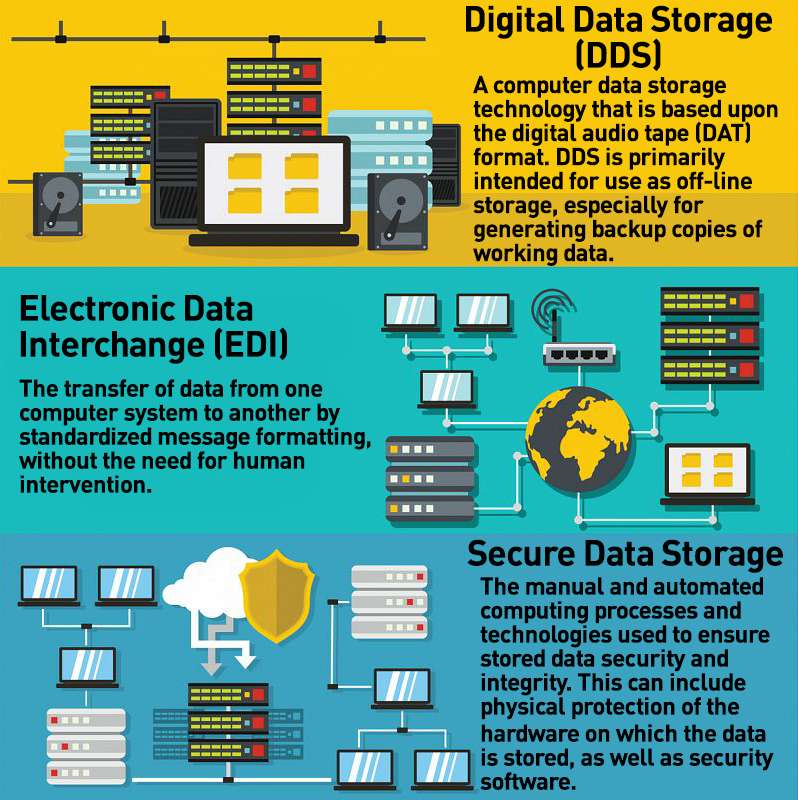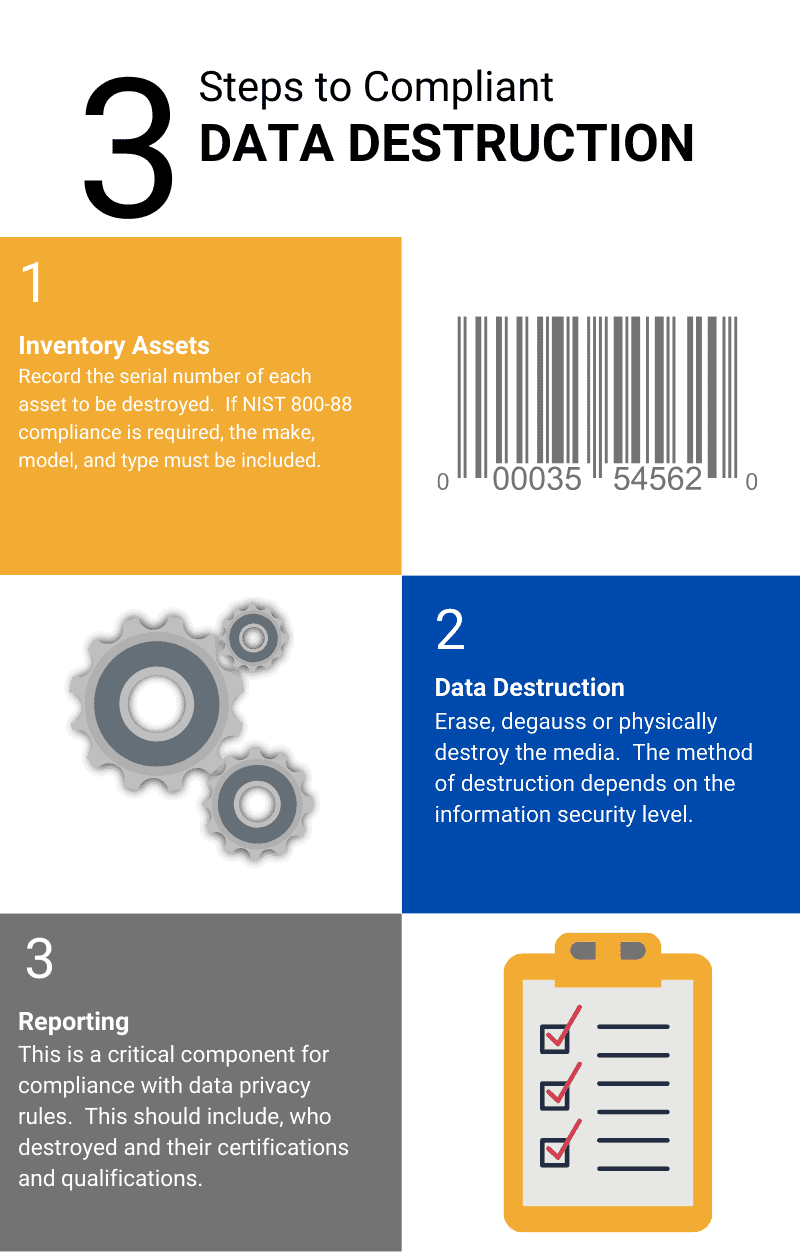Essential Cyber Security Practices for Effective Data Destruction Strategies
Essential Cyber Security Practices for Effective Data Destruction Strategies
Blog Article
Exploring the Value of Data Devastation in the Context of Computer Safety And Security Solutions and Protecting Confidential Information
In a period where information breaches are increasingly typical, the importance of effective information damage can not be overemphasized. What strategies can organizations carry out to enhance their data devastation protocols?
Comprehending Information Destruction
Data damage is a vital part of computer safety and security that entails the permanent removal of information from storage space devices to prevent unapproved accessibility and potential data violations. In a significantly digital landscape, companies face heightened dangers linked with delicate information being poorly accessed or exploited. Efficient information devastation safeguards against these threats, guaranteeing that personal dataâEUR" such as customer info, intellectual home, and financial recordsâEUR" can not be recovered after disposal.
Understanding the relevance of data destruction extends past plain conformity with regulatory and legal frameworks; it is necessary for keeping business integrity and trust. When data is improperly taken care of or improperly damaged, the consequences can be severe, including financial loss, reputational damages, and lawful liabilities.

Methods of Data Obliteration
/prod01/channel_3/media/tcd/itservices/images/Untitled-design-(26).png)
One prevalent method is information cleaning, which involves overwriting existing data with random patterns several times. This method makes the original data irretrievable, making it a prominent selection for companies looking for to protect secret information.
Another method is degaussing, which uses an effective electromagnetic field to interrupt the magnetic domains on storage tools, effectively erasing the information. This strategy is particularly effective for magnetic media however is not appropriate to solid-state drives.
Physical devastation is one more durable technique, squashing or involving the shredding of storage space gadgets. This approach assurances that data recuperation is virtually difficult, making it perfect for highly sensitive details.
Last but not least, file encryption can act as a complementary technique to data elimination. By encrypting data before deletion, companies can include an additional layer of protection, guaranteeing that even if remnants are recovered, they remain unattainable without the decryption key. Each technique must be chosen based upon the level of information level of sensitivity and the specific security requirements of the company.
Legal Conformity and Data Safety And Security
Organizations must browse an intricate landscape of lawful requirements connected to information security, particularly after implementing techniques of data obliteration. Various laws, such as the General Data Defense Guideline (GDPR) and the Medical Insurance Portability and Accountability Act (HIPAA), enforce rigid guidelines on exactly how companies should get rid of and deal with of delicate information. Failure to adhere to these regulations can cause significant legal effects, including considerable penalties and reputational damage.
Data devastation processes need to be diligently documented to demonstrate conformity with relevant laws and requirements. This paperwork not just functions as evidence of adherence to lawful commitments however also illustrates a dedication to securing sensitive information. Organizations needs to also develop clear policies concerning information here are the findings retention and destruction my explanation timelines, guaranteeing that data is not held longer than essential.

Furthermore, normal audits and analyses of data destruction practices are necessary to preserve conformity and adjust to developing legal frameworks (data destruction). By proactively dealing with legal demands, organizations can reduce dangers connected with data breaches and show their commitment to data safety. Inevitably, focusing on legal conformity in data destruction procedures is not simply a regulative obligation, but a fundamental aspect of a durable data safety and security strategy
Effect On Business Online Reputation
The online reputation of a service can be considerably impacted by its technique to data devastation and administration. In today's electronic landscape, where data violations can happen at any minute, the failure to effectively take care of delicate info can lead to extreme repercussions. Organizations that improperly manage information destruction danger exposing private consumer info, which not just breaks personal privacy laws yet likewise deteriorates count on amongst stakeholders and customers.
A ruined credibility can result in reduced customer loyalty, as customers come to be hesitant to involve with an organization that has actually demonstrated carelessness in shielding their data. Negative promotion bordering an information violation can have a lasting result, as potential customers might be prevented by the regarded absence of security. This can lead to a straight decrease in income and market share.
Moreover, companies that prioritize data damage as component of their safety and security method can boost their reputation by showcasing their commitment to safeguarding sensitive information. By adopting rigid information monitoring techniques, companies can not only reduce dangers however additionally place themselves as credible entities in their particular markets, thus enhancing their overall brand picture.

Finest Practices for Secure Disposal
Executing best practices for secure disposal redirected here of information is vital for alleviating risks related to information violations and making certain compliance with personal privacy guidelines. Organizations ought to take on a detailed data disposal plan that details procedures for both physical and electronic data damage.
For physical data storage tools, such as disk drives, shredding or degaussing is recommended to avoid information recovery. In addition, organizations need to keep a chain of wardship paperwork throughout the disposal process, ensuring responsibility and traceability of disposed items.
For electronic information, making use of software application that sticks to market criteria for data cleaning is crucial. This software program should overwrite existing data numerous times, making recovery virtually difficult. It is also crucial to verify the efficiency of the data destruction procedure through audits or third-party evaluations.
Training staff members on secure disposal methods includes one more layer of safety, as human mistake can frequently lead to information direct exposure. On a regular basis upgrading and examining disposal plans makes certain placement with evolving laws and technical innovations. By applying these best practices, organizations can substantially minimize the danger of unapproved information gain access to and enhance their overall information security technique.
Final Thought
In conclusion, information devastation is a fundamental aspect of computer protection solutions that makes certain the defense of confidential information from unapproved access. Executing efficient techniques of data removal, adhering to legal conformity, and acknowledging the influence on service online reputation are essential parts of a thorough information protection approach. By embracing best practices for protected disposal, companies can promote count on with clients and guard delicate information, eventually contributing to a more safe and secure electronic landscape.
In an age where data violations are progressively common, the value of reliable data devastation can not be overstated.Data devastation is a crucial part of computer protection that includes the permanent removal of data from storage space devices to protect against unauthorized gain access to and potential information breaches. Organizations must also develop clear policies pertaining to data retention and destruction timelines, making certain that data is not held longer than essential.
By proactively dealing with lawful requirements, companies can mitigate dangers connected with information breaches and show their dedication to data protection (data destruction). Ultimately, focusing on lawful conformity in information destruction processes is not just a regulatory obligation, but a fundamental element of a robust data safety and security strategy
Report this page